1) Lawyers are expensive -- oof! A startup lawyer can cost you $300-$1k per HOUR! An associate paralegal may be slightly cheaper. But still pricey.
What do you need from a lawyer?
-company setup costs
-doc creation and review for financing rounds
-exit negotiation
2) For the purpose of this thread, we're just going to focus on setup costs, because this is where I see the most mistakes.
Once you get going, you may quickly realize you need a better lawyer - hah - and that generally helps w/ solving for financing rounds and exits
3) If you want to potentially raise money from VCs, you'll want to set up as a Delaware C Corp. If you don't ever want to raise from VCs, an LLC is fine.
Lots of ppl start out as an LLC because you can get tax benefits if you are not profitable.
4) But to me, if you know you want to raise VC money, it feels a bit penny wise / pound foolish, because you will need to spend $$ to convert your LLC to a Delaware C corp.
5) Why don't VCs invest in LLCs?
Because of taxes. LLCs are pass-through entities. So if your company makes (or loses) money all of your investors (yours partners) will be able to apply that to their personal taxes.
This can be ok for your angel investors.
6) But a fund like mine has < 99 investors in my fund!! I guarantee you that none of them want to be doing extra tax work to report the income (or losses) of one of our startups.
It's too much of a headache for everyone.
7) So VCs literally will NOT invest unless you are a C corp (or unless they are really a family office with just one investor). It's not an excuse.
8) So if you want to shoot for VC money, set up a Delaware C corp. These days there are a few options: 1) templated services, 2) boutique lawyers, 3) big firm lawyers
9) The templated services (like Clerky or Stripe's Atlas program) are super cheap and will spin up docs for you easily.
There may need to be adjustments down the road, but IMO, you can get going and fix later if need be.
10) But if you are going through a financing soon, you'll definitely want a lawyer to review everything. A boutique law firm is usually a lawyer on his/her own.
11) A boutique lawyer typically is cheaper (because there's low overhead -- no need to pay for a fancy lobby) and generally more personable IMO.
Look for someone with big law firm experience who left to start his/her own firm.
12) A big law firm is like a Gunderson. Or a Wilson Sonsini. They have lots of lawyers. And lots of experience. And big hourly rates too. :)
13) Whether you go with a big firm or a boutique firm, make sure your lawyer has EXPERIENCE w STARTUPS! I cannot stress that enough.
Esp if your company is NOT in Silicon Valley or NYC, I would actively seek a lawyer in Silicon Valley. So many inexperienced lawyers mess up.
14) Now you may be wondering, why would I pay for a big firm lawyer if I could find a cheaper boutique lawyer w big firm experience?
One thing big firms can provide are engagement letters that give you some services for deferred fees.
15) If a lawyer is impressed by your startup enough, they may offer you a certain number of hours / services for deferred payment. And after that, if you raise $X, you are on the hook for paying them back at their market rates in cash.
16) If you can get one of these deals from a big firm, that can be great, because if your company goes under before you raise $X, you are not out of pocket on your legal fees.
Also you can shop around. Much like how you can shop around with VCs, you can approach many big firms.
17) And once you have a deferred payment offer from one firm, many firms will put forth their best offers.
Things that are negotiable are:
-cost of services / amount you can defer
-min raise amount before you need to pay
18) Note: this can also be applied to funds. Funds typically have much heftier legal expenses, and this applies to funds as well.
19) However, it's important to note that if you have an offer for deferred payment, it may *feel* free but it's not actually. Hah.
That is how you become a client at high rates.
20) So sometimes it can better to pay out of pocket w/ a boutique firm (who doesn't give these offers) because their rates tend to be significantly lower. Nothing is ever free in life.
I've done both and it depends a bit on your own cash situation.
21) Ok, so let's say that you pick a lawyer. Your lawyer will help you incorporate, set up your stock plan, and employment agreements.
With this, you're in business! You are a legit company.
22) Things to note - you and your employees will have 4 yr vesting in place. Meaning your stock grant will only come to maturity if you stay at the company all 4 years.
There's a 1 yr cliff, which means you get 25% of your grant after the first year but nothing prior to that.
23) Without vesting, VCs won't want to invest. Or they may negotiate with you to add vesting as part of an investment agreement. They want you and everyone to be incentivized to work on the company.
24) You and your employees will also assign IP to the company. Meaning, anything you develop / design / create, belongs to the company.
25) Lastly, you want to make sure you have a lawyer you can trust on business advice as well. You may have to lean on your lawyer to give you the pros and cons later on for various financing offers or exit opportunities.
Sometimes you may need to switch lawyers.

